Key takeaways:
- Selective mutism is a complex anxiety disorder characterized by a child’s inability to speak in specific social settings while being able to communicate comfortably in others.
- Causes of selective mutism include underlying anxiety, childhood experiences, societal pressures, and genetic factors that contribute to a child’s anxiety levels.
- Raising awareness and understanding of selective mutism is essential to dismantle stigma, promote empathy, and improve support systems for affected individuals.
- Common misconceptions include the belief that mutism is a choice, that affected individuals do not communicate at all, and that it only affects children.
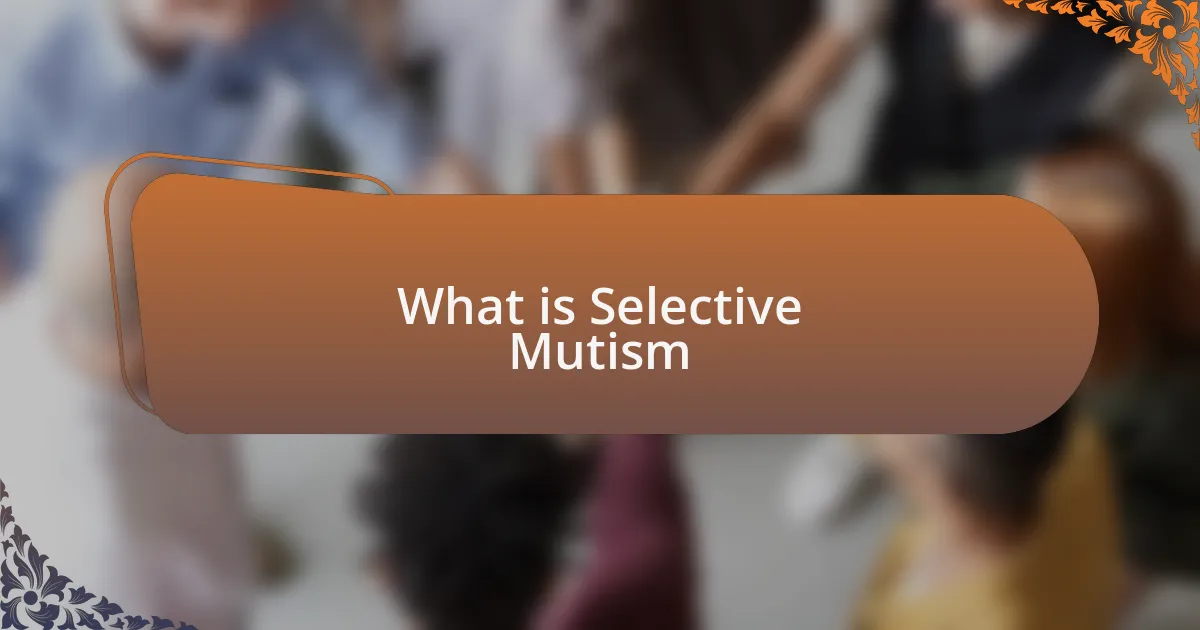
What is Selective Mutism
Selective mutism is a complex childhood anxiety disorder that affects a child’s ability to speak in certain social situations, despite speaking comfortably in other settings, like home. I remember feeling this disconnect vividly; I could chat with my family at dinner, but as soon as a teacher called on me in class, it was as though my voice vanished. This experience often left me feeling isolated, as if there was a barrier between me and my peers.
At its core, selective mutism often arises from overwhelming anxiety. Imagine standing in a room filled with people, a knot in your stomach tightening with every glance in your direction. That’s how it felt for me—almost paralyzing. The challenge lies in the pressure to speak, which can trigger a response that feels completely beyond one’s control. Have you ever felt so anxious that just the thought of speaking made your heart race? That’s the daily reality for many who experience selective mutism.
Understanding selective mutism is crucial for fostering empathy and support in social environments. When I communicated my struggle to my friends, I often saw their eyebrows raise in surprise, as they couldn’t understand why I wouldn’t simply “speak up.” It’s important to recognize that selective mutism isn’t about defiance or rudeness; it’s a genuine struggle with anxiety that needs compassion and understanding.
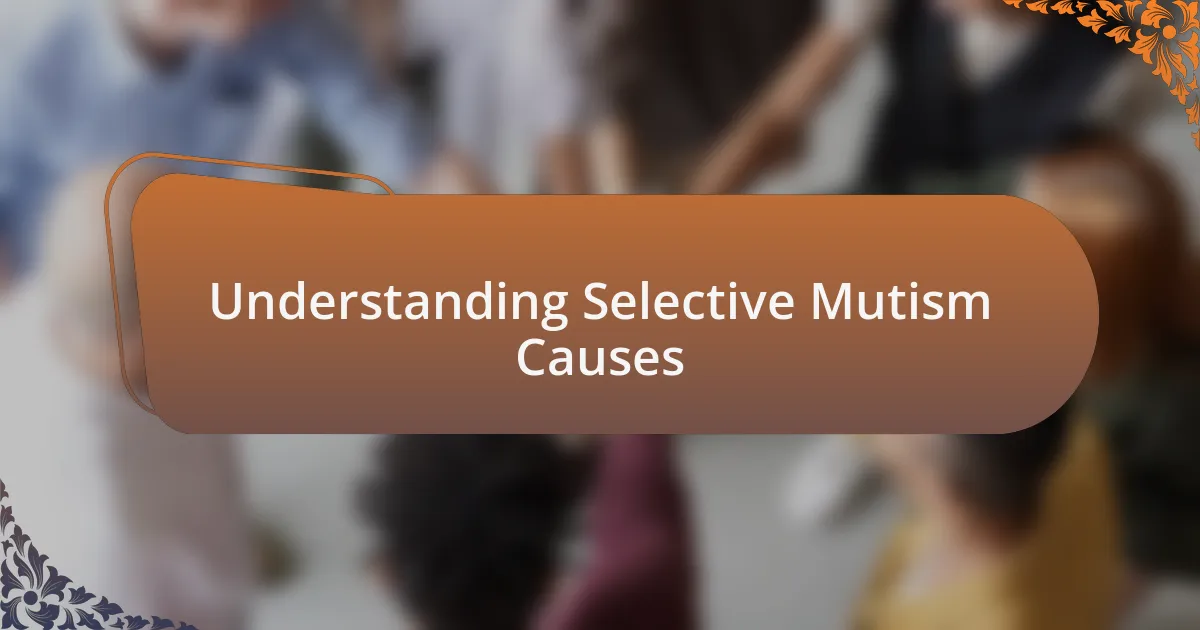
Understanding Selective Mutism Causes
Selective mutism can be traced back to various underlying causes, often intertwined with anxiety, temperament, and environmental factors. I recall a particular instance when a small group of friends decided to try a new restaurant. While everyone enjoyed the lively chatter, I felt my anxiety amplifying, making it nearly impossible to join the conversation. This made me realize how certain situations can act as triggers, amplifying my fears.
Childhood experiences also play a significant role in developing selective mutism. For instance, I had a friend who was exceptionally shy and was always praised for being “a good listener.” This constant reinforcement of silence over verbal expression may have contributed to her own selective mutism. Reflecting on this, I wonder how often societal expectations shape our willingness to speak or remain silent, especially in settings laden with social pressure.
Moreover, genetic factors can influence a child’s vulnerability to selective mutism. I remember discussing this concept with a therapist who pointed out that if anxiety runs in the family, it might explain why I felt such a strong urge to retreat into silence. Have you ever considered how much of our behavior can be traced back to our roots? It’s an intriguing thought that emphasizes the complexity of this condition.
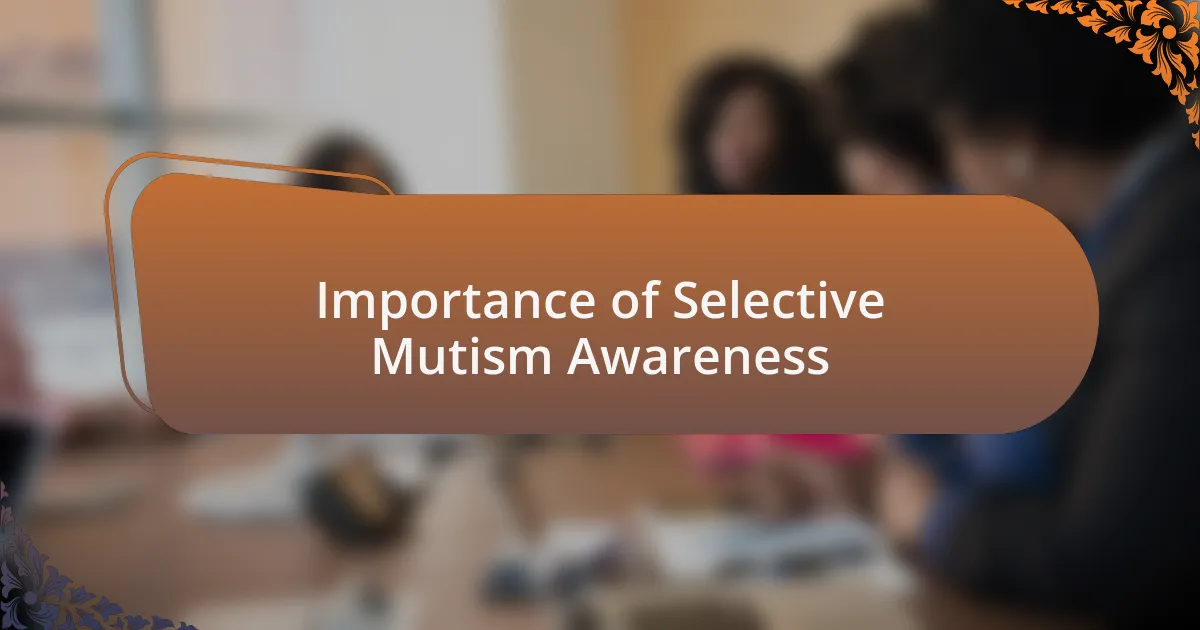
Importance of Selective Mutism Awareness
Selective mutism awareness is crucial for fostering understanding and empathy among peers. I remember a time when a close friend misinterpreted my silence as disinterest, which really hurt because I was simply overwhelmed. When we share our experiences, we pave the way for more supportive environments where individuals with selective mutism feel safe to express themselves in their own time.
Raising awareness about selective mutism can also help dismantle the stigma surrounding mental health challenges. I often find myself reflecting on how labels like “shy” can oversimplify a complex condition. By discussing selective mutism openly, we encourage others to recognize the depth behind these labels and to approach individuals with kindness rather than judgment.
Additionally, increasing awareness can lead to better resources and support systems for those affected by selective mutism. I vividly recall attending a workshop designed to educate educators about the condition. It struck me how a small shift in understanding could significantly improve a child’s school experience. Have you ever witnessed the profound impact that knowledge can have on a community? It’s remarkable how awareness can transform perceptions and ultimately lives.
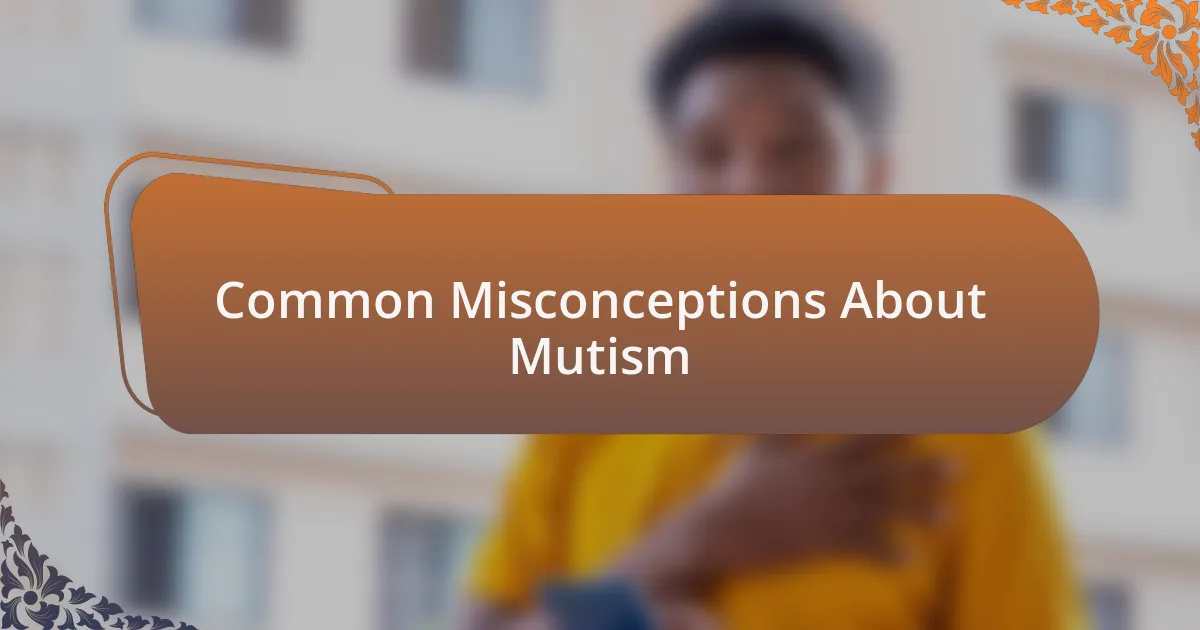
Common Misconceptions About Mutism
A prevalent misconception about mutism is that it’s purely a behavioral choice, where people think those affected simply choose not to speak. I can recall a moment when I was at a gathering and someone said, “Just talk! It’s not that hard.” That comment stung because it completely overlooked the anxiety and fear that can accompany each word.
Another misunderstanding is the belief that individuals with selective mutism do not communicate at all. I remember feeling frustrated when a classmate thought my silence in group projects meant I had nothing to say. In reality, I was engaged and listening intently; I just struggled to voice my thoughts in that setting. This misunderstanding can lead to feelings of isolation and being misunderstood, which only adds to the challenges we face.
Lastly, many people assume that selective mutism only affects children. From my experience, I can assure you that it can persist into adulthood. I have met several adults who still grapple with this condition, navigating social situations and feeling pressured to conform to norms that can feel insurmountable. Has anyone ever told you to “just grow out of it”? I truly wish it were that simple.
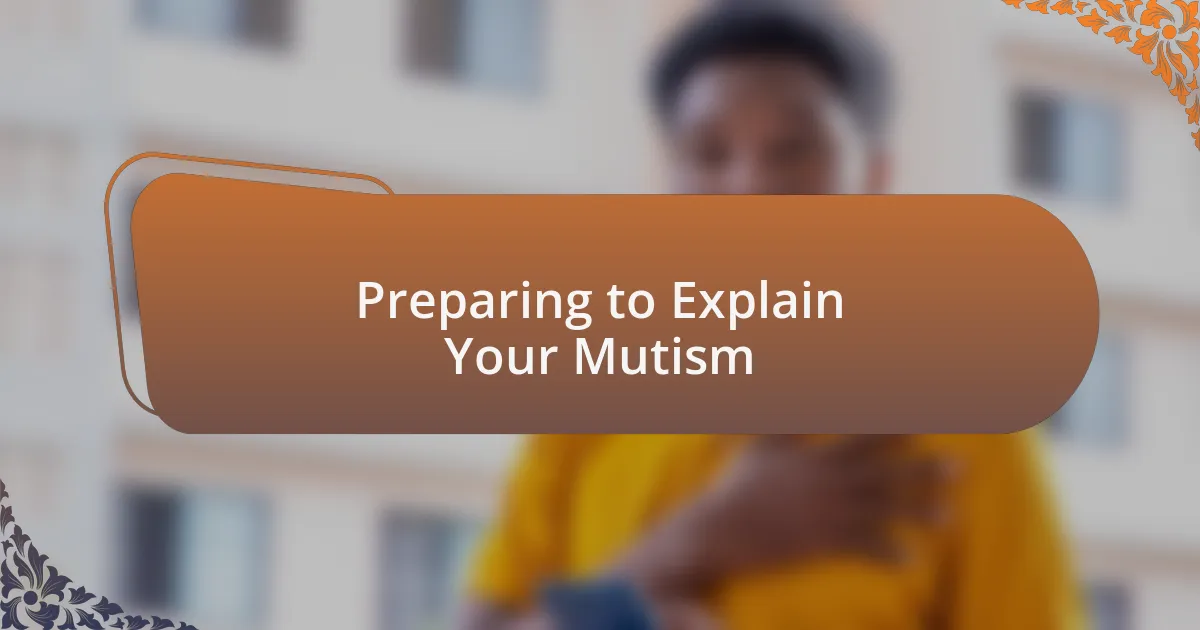
Preparing to Explain Your Mutism
When preparing to explain my mutism, one of the first things I learned was the importance of choosing the right moment. I remember a time when I attempted to explain to a friend during a chaotic hangout, and it didn’t go well. Sometimes, I ask myself, isn’t it crucial to approach these discussions in a quieter, more personal setting where both sides can truly listen?
Visual aids can be incredibly helpful in conveying my experiences. I once created a simple diagram showing my feelings in different social situations. When I shared it with a close friend, their eyes lit up with understanding. Have you ever thought about how visuals can bridge the gap in difficult conversations? It certainly transformed how my friend perceived my challenges.
Practice is key, too. Before sharing my story, I often rehearsed what I wanted to say in front of a mirror or wrote it down. This helped me build confidence and clarity. I remember the weight lifting off my shoulders when I finally articulated my feelings. Isn’t it fascinating how preparing oneself mentally can make all the difference in communication?
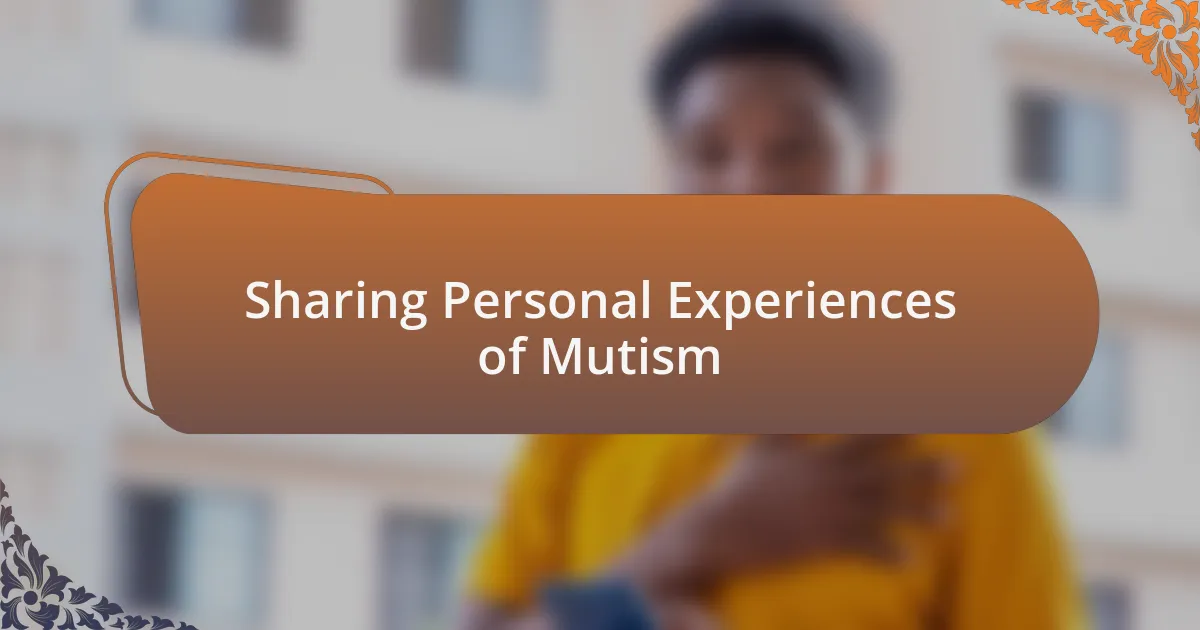
Sharing Personal Experiences of Mutism
Sharing my personal experiences of mutism has often felt like unwrapping a tightly sealed gift. One time, I chose to confide in my best friend over coffee. As I spoke, I watched her expression shift from confusion to empathy, which made the moment feel so validating. Have you ever felt that rush of relief when someone finally gets it?
I also recall a time when I tried explaining my mutism during a group project. My peers were bustling with ideas, and I felt lost in the noise. I took a deep breath and shared my struggle to vocalize my thoughts, and surprisingly, they responded with genuine support. Isn’t it incredible how vulnerability can foster connections in unexpected ways?
Sometimes, I struggle with the urge to retreat even after sharing my experiences. I remember a particular outing where I opened up about my mutism, and although it was well-received, I still felt anxious afterward. Have you experienced that internal conflict between wanting to share and fearing judgment? It’s a constant journey of balancing honesty with the fear of misunderstanding, but each conversation adds another thread to my tapestry of experiences.